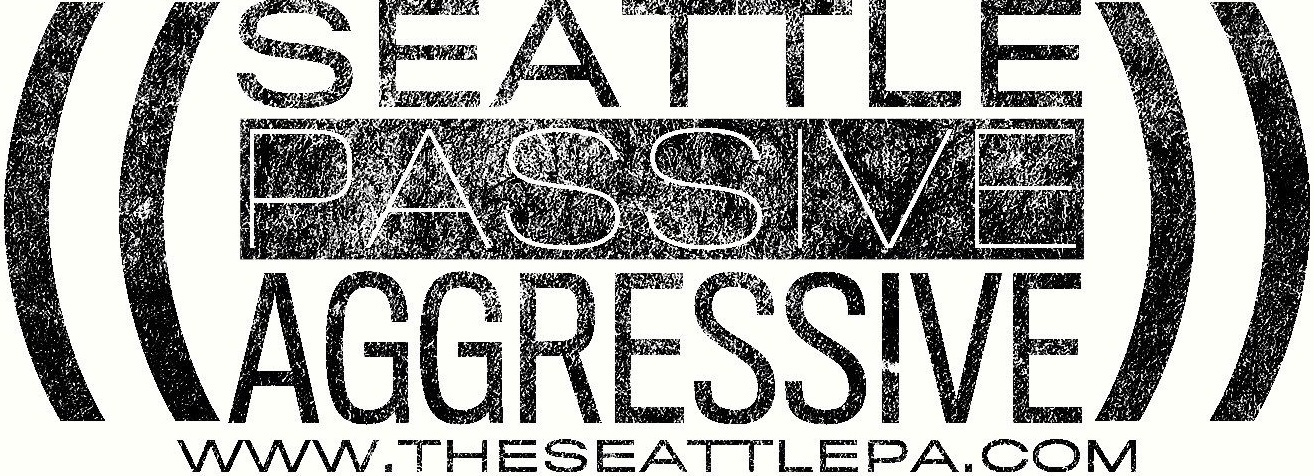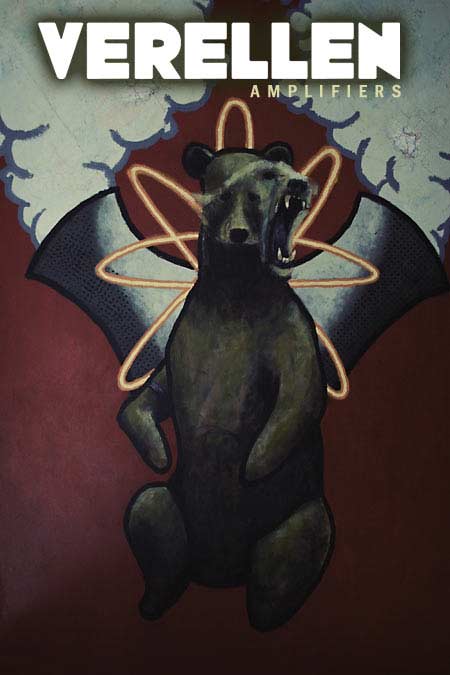Sitting Down With Sumac
By Jeffery McNulty
SUMAC is Aaron Turner (Old Man Gloom, Mamiffer, Isis), Nick Yacyshyn (Baptists) and Brian Cook (Russian Circles, These Arms Are Snakes, Botch). Their first record, The Deal was released in 2015 through Profound Lore Records and garnered much acclaim for the EP and for their intense live shows. Their second outing, the full length What One Becomes, is a roller coaster ride and will no doubt be many fans’ favorite album of the year. I met with them before their show at The Black Lodge in Seattle to catch up and talk about this new record. First we chatted about the commentary on Spinal Tap, then Conan, then Beastmaster. I forgot to press record before the actual interview but consensus was that the commentary on Spinal Tap was so excellent you could watch it twice in a row, once with and once without, Schwarzenegger’s was hilariously bad and that Don Coscarelli ruled but none of us could remember Beastmaster 2. Then we got serious.
What One Becomes is arguably the most aggressive record by a group whose combined musical output is some of the gnarliest, heaviest music ever. It begins with a cacophonic crash of drums and guitars, devolves into one guitar line then picks up as a brutal riff backing the most evil sounding vocals Aaron Turner has ever put on wax. The rhythm section, featuring Brian on bass, match each other note for note in intensity, drummer Nick rivaling Brann Dailor of Mastodon in the of notes he can play clearly to each riff. The snare drum literally explodes, adding to the already unhinged sound the lyrics impart to some of the passages. Although most of the music was conceived and written by Aaron originally (he later did all of his vocals as well as extra guitars and textural stuff at home on Vashon Island, WA) the bulk of what you hear was recorded at The Unknown in Anacortes, WA. “I was really hoping that the atmosphere of the space would be inspiring,” says Aaron, “aside from just being the utilitarian place where you go to record something, and it definitely leant something to the experience for sure, apart from just the acoustic properties, it had a very palpable atmosphere as well.”
An atmosphere that comes through in the recording remarkable well, aided largely by the mixing prowess of Kurt Ballou who is exceptional at taking the heaviness or aggression a band has live and projecting that level of intensity to the world in a recording. To anyone who has been lucky enough to see a Sumac show, it will come as no surprise that what you hear on What One Becomes is pretty much what you hear when seeing it played in person. Aaron agrees, “I think part of the reason we like working with Kurt is he has his own sound which he brings to stuff but he’s also very good at capturing a bands natural energy and I feel like that’s what he did very well with this record. He’s good at getting sounds documented in a very thorough way, which is an art in and of itself, but he did a very good job of accurately representing us as players. To me, when I hear the record I hear all of us as we are, which I think is pretty much what a recording should do.” “I think he’s also good in that he allows a good amount of slop” adds Brian, “I think that’s very crucial because a lot of Metal records are so concentrated on being tight, they just sound like they’re built on a grid. He’s even looked into how the major Metal dudes put a record together and it’s more like an electronic record at this point, so unnaturally ridged. Ultimately I don’t think that kind of obsessive approach to heavy music usually has good returns, I think it robs some of the life from things. Kurt’s got a good discipline in terms of wanting good performances and wanting things to be tight and sound right but is definitely good at letting some things be loose. I can listen to things on this record and there are times where it’s not totally locked into place but I think that’s good, it makes it sound like a real band and that helps with the energy.”
There are many parts on the record that sound almost free form, as if they were jammed or built in the studio but according to Aaron, they all had a good idea of what was going to be played but not exactly how but in some way they always coalesce into a crushing riff. All of that was intentional, some parts were left purposely loose and allowed to evolve in the studio, “The parts may be different each time we play them in terms of the tempo or the space between things but there is a fundamental idea at work. I do think the studio had an impact though in the sense of being in that room, all of us together, tracking live and being able to feel the sound reverberate in the space had something to do with the way that we played the parts. So, in that sense I think the studio played a roll in how the final performances came out.” Brian picks up the story line, “It would have been almost impossible to do this record, in some ways, if we hadn’t done it all together in a room live; the first five minutes of the record, if it hadn’t been three people playing all together in unison… there is so much push and pull with tempo, and a certain level of spontaneity involved that wasn’t there on The Deal just because of the circumstances of making it, but it makes the new record it’s own entity.” It is the kind of spontaneity that is only possible when everyone is playing together rather than being built through a series of overdubs continues Aaron, “At least for those types of parts, though they’re not these very structured and clearly laid out parts, we are feeding off of each other as we’re playing them, and that’s part of what helps solidify the structures. I don’t think, as Brian said, that there could have been any other way, at least that would have been convincing from a listener’s point of view.”
In Sumac’s press release there is a very long and heavy quote from Aaron, explaining what the record is about; that in essence the song’s structures “parallel the internal and personal struggles with anxiety.” But one doesn’t need the liner notes to get what the musicians are laying down. What One Becomes is clearly ABOUT something and even if the uninitiated listener can’t make out every syllable of the gruffly sung lyrics that feeling isn’t lost. Far from it in fact, “there is very intentionally supposed to be a clear vision that’s readable from a listener’s point of view.”
Aaron’s writing process is helped by the seclusion he feels living on Vashon, a thirty-seven square mile island southwest of Seattle, “The initial writing process for me is a very solitary thing, I need to just be able to dive into the stuff and play for a couple hours on end at a time and it helps if I can do that on a daily basis. So it becomes kind of a ritual and I think that’s pretty fundamental to the way the record comes out as a whole. We intend these things to be a complete experience, the songs matter individually but they also come together as a whole in a way that should feel linear and have some kind of cohesive narrative. So I feel like that process of writing the way I did contributed a lot to that in terms of having really solid thematic elements.”
Another intentional move by the band is to not tour incessantly, partially because of the fact that all three members live in different cities (Nick in Vancouver, Canada and Brian lives in NYC “for now”) but also because, “We are all getting older,” explains Brian, “and going out on tour for a full month at a time just doesn’t have the same appeal… There’s not really any reason to tour for any longer than two or three weeks, unless you are in Europe or something and you’ve made the investment in going over there. In the U.S. it’s so much better to do things in short bursts and be excited about it the whole time instead of being miserable and unhappy for half the time.” Aaron concedes that it is to some extent a product of aging, “There is the physical aspect of it but I also feel like there’s a mental and emotional aspect too where when I was younger I didn’t really need any solidity in my life, I liked just being out and doing things constantly and now I feel like: I like where I live, I like the person I live with, I like having in some ways a regimented life it feels good to me it’s a grounding thing. So the idea of going out for six or eight weeks at a time… this music is very intense and it’s very physical and I would rather feel like I could put a shit-ton of energy into ten or twelve shows and feel good about it, feel like I’ve got stamina and the will to do it. Rather than go out for longer and just feel that grinding down that I’m familiar with where you don’t want to play your music anymore and you don’t have the strength to do it. Short concentrated bursts is pretty much the M.O. for the way we do the band in general.”
Another deliberate move was the one from their previous label to Thrill Jockey, a label that isn’t immediately known for loud aggressive music. Their roster is not just Sea and Cake and Trans Am; they also have put out records by heavy/weird luminaries Wreckmeister Harmonies and Liturgy as well as YOB’s Mike Scheidt. The idea was to broaden the scope of their audience, “I really like Profound Lore and they were super supportive; they agreed to do our record before it we were even a band and that’s a pretty awesome statement to make as a label just to be able to do that. I also feel like Profound Lore has a built in audience which is great and part of what made it appealing but also limiting in the sense that I don’t feel like it goes much beyond the world of Metal and heavy music. Our music certainly is very heavy and it’s at least partially Metal based, to some degree, but I also feel there are a lot of other facets that might appeal to people that just like adventurous music that might not necessarily know a lot about Metal or might not even like it necessarily. I feel like Thrill Jockey is a very good place for that. I guess they kind of have their flagship artists like Tortoise and stuff, which is cool, but I also feel like they’ve earned a reputation as an adventurous label that isn’t following one genre specifically, and I feel like that’s a really good place for us to be.” The Thrill Jockey signing actually came about very naturally; they distribute Aaron and his partner Faith’s label Siege Records, so they had worked together before. The last time they played in Chicago their friend Bettina from Thrill Jockey came out to see them play. Aaron mentioned they were thinking about doing a record somewhere besides Profound Lore and “Bettina was very enthusiastic about the idea. That’s another thing for me: I like to go where we are wanted. I feel like some people want to go to whoever has the most money and I understand that to some degree but I feel like it’s much more important to have people who really believe in what you are doing because their incentive to work on it is going to be more sincere and I think in most cases better if there is a goal behind it other than just money. Cause no one is doing this kind of music and getting rich off of it. You have to believe in it.”
Making music this full of heart and passion is indeed something you have to believe in to make it work. Three comrades from around Northern Hemisphere came together and create art then get in a van and present it to the world in a manner that is so true you can’t help but feel the emotions present in the music without a lyric sheet, without being totally analytical. Aaron hopes that, “people will be able to absorb what they need to out of it and I also feel like if something about it resonates with you in a way that feels like understanding, that’s good enough. And I think that’s the way most people are going to experience the music anyway.”
Go out and get the record, available today on Thrill Jockey. Be adventurous; even if you don’t like Metal, go see the show.
http://www.thrilljockey.com/products/what-one-becomes
https://www.facebook.com/SUMACBAND/











